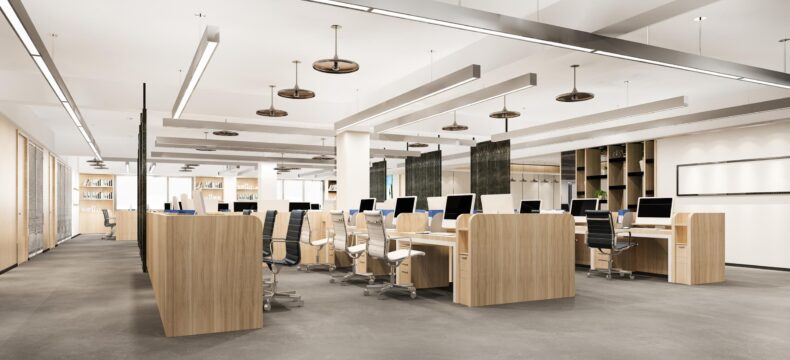Five Tenant Must-Haves in Today’s Commercial Real Estate Market

The commercial real estate market continues to adjust to shifting office space needs since the pandemic. Even as employers implement return-to-office (RTO) policies, in-office work hours are 30% lower than pre-pandemic norms and projected to remain there. As a result, tenants have different priorities and expectations when making decisions about their office space.
The ongoing flight to quality continues.
Companies are redefining their objectives for their office space. Physical office space plays a strategic role in enticing employees to return to the office. It’s also a factor in recruiting and retaining employees in a competitive job market. Organizations expect their office space to help boost productivity, inspire collaboration and spark creativity.
Sixty percent of companies have adopted a hybrid work model, with employees splitting the week between in-office and remote work. As a result, many companies are looking to reduce their office footprints. However, reducing the amount of space doesn’t always mean an organization is looking to cut costs. Instead, many companies are opting to upgrade their office space as part of their strategies to attract and retain top talent.
Upgrading the quality of office space can take many forms, such as location and amenities. In the competition for tenants, commercial property owners are upgrading shared amenities in their buildings, such as conference centers, tenant lounges, fitness centers and cafes.
Employers seek more collaborative workspaces.
The days of employees commuting to an office to spend eight hours working in a cubicle are gone. Instead, employers are looking to make the office an appealing destination that promotes productivity and interaction. Office design can play a major role in bringing people back to the office. Today’s employers are seeking collaboration areas, meeting spaces and team-focused workstations that help employees connect. At the same time, they also want space that provides privacy for focused work and larger meetings.
Office tenants are responding by designing spaces that are both functional and flexible. That means providing more open floor plans and multi-functional spaces. Landlords are also recognizing the need to provide common amenities in their buildings. Offering the ability to reserve rooms in a conference center that’s shared by the property’s tenants is an appealing amenity and provides the opportunity for tenants to reduce their footprint even further.
High-tech infrastructure is a priority — and a differentiator.
In hybrid work environments, businesses rely on technology more than ever. Having technology infrastructure in place to support high-speed internet and seamless virtual meetings is essential for commercial properties. Investing in smart building technology offers another opportunity for properties to stand out in the competition to attract and retain tenants.
Smart buildings unite building-wide systems into a single IT platform to manage everything from heating and cooling to lighting and security. In a hybrid work environment where in-office attendance varies, having automated systems that can adapt to operational needs provides efficiencies and cost savings for both property owners and tenants. In addition, many commercial tenants prioritize energy efficiency and sustainability when evaluating office options.
Companies want to reduce their capital expenditures.
As smaller and mid-size companies look to upgrade their office space, they don’t necessarily want to spend a lot on custom build-outs. In the current market, move-in-ready spaces or “spec suites” that are built out by the property owner before a tenant signs a lease have increasing appeal.
While spec suites require property owners to invest upfront, they can be a differentiator because tenants are able to better visualize how the space will work for their needs. This gives them the ability to make a move without significant disruptions in productivity and allows tenants to avoid exposure to the current inflated construction costs and lead times.
Lease flexibility is a must.
Workplace needs are evolving quickly. Commercial tenants are looking for lease terms that give them the flexibility to navigate changing business needs, whether it’s rapid changes in headcount or the fluctuating in-office demands of a hybrid workforce. Property owners are responding by working with tenants to create as much flexibility as possible while still meeting the financial obligations of building ownership. This can come in the form of expansion, contraction and termination options to appease the needs of their tenants.
CBIZ Gibraltar develops and implements unique real estate solutions and addresses current space demands, so your company’s long-term business goals are at the forefront of your office policies. When evaluating your office space needs, our team provides executive real estate strategy, market and financial analyses, and comprehensive lease negotiations to best suit business needs and objectives.
